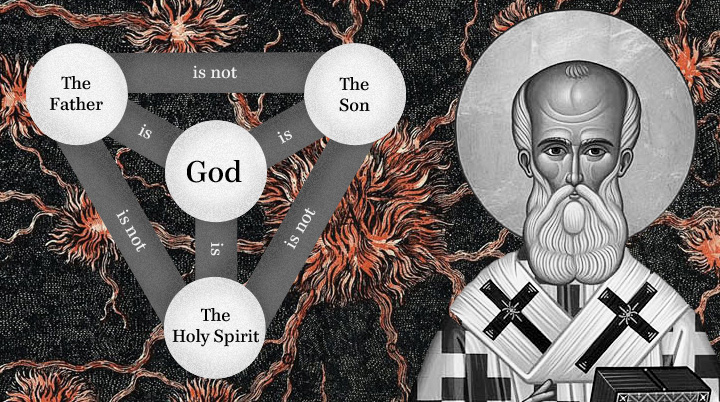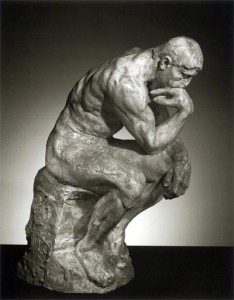
I love the Trinity. That’s because I love God, and God is a Trinity.
Very few people have a firm grasp of the concept of the Trinity. It is important therefore to determine what we as Christians mean by the term. The doctrine of the Trinity, stated simply is that there is one eternal being of God, and this one being of God is shared by three co-equal, co-eternal persons, the Father, the Son, and the Holy Spirit. God is therefore one in essense and three in personality.
It is necessary here to distinguish between the terms “being” and “person.” It would be a contradiction, obviously, to say that there are three beings within one being, or three persons within one person. There is no contradiction though because that is not what is being said at all. There is one eternal, infinite being of God, shared fully and completely by three persons, Father, Son and Spirit. One what and three who’s.
All the major cults today (Jehovah’s Witnesses, the Latter Day Saints or Mormons, etc.) contend that Christians have simply made up the concept of the Trinity, saying that the term is not even found in the Bible. Though it is true that the actual term cannot be found in Scripture, I would have to say, “so what?” for even the word “Bible” is not found in the Bible! The term “Bible” comes from the word biblos meaning “book,” and therefore means “the Book.” The Bible is not just “a” book but “the” book, because it is the very Word of Almighty God, and therefore the most important book anyone can ever read; for it is the only one that is inspired by God. (2 Tim. 3:16).
It is on the basis of Scripture itself that Christians throughout the centuries have professed belief in the Holy Trinity, affirming the fact that our one God is eternally existent in three Persons: the Father, the Son and the Holy Spirit, who are co-equal, co-existent and co-eternal. This is because the following three things are very clearly taught in Scripture:
(1) There is only one God, who is eternal and immutable (unchanging).
(Deut. 6:4; Isa. 43:10; Mal. 3:6; Mark 12:29; John 17:3; 1 Tim. 2:5; Jam. 2:19)
(2) There are three eternal Persons – the Father, the Son, and the Holy Spirit. These Persons are never identified with one another – that is, they are carefully differentiated as distinct Persons. The Father is not the Son, nor the Son the Holy Spirit, and nor is the Holy Spirit the Father.
(Matt: 3:13-17; 28:19; Luke 10:22; John 1:1, 2; 3:16, 17; 15:26; 16:7; 17:1-26; 2 Cor. 13:14)
(3) The Father, the Son, and the Spirit, are identified as being full Deity – that is, the Bible teaches the Deity of the Father, the Deity of Christ and the Deity of the Holy Spirit.
(Isa. 9:6; John 17:3; John 1:1, 18; 8:58; 20:28; Phil. 2:5-11; Col. 2:9; Titus 2:13; Heb 1:8; 2 Pet. 1:1; Acts 5:3, 4; 2 Cor. 3:17, 18)
From: A Faith to Confess: The Baptist Confession of Faith of 1689 – Rewritten in Modern English
CHAPTER 2 – GOD AND THE HOLY TRINITY
1.THERE is but one, and only one, living and true God. He is self-existent and infinite in His being and His perfections. None but He can comprehend or understand His essence. He is pure spirit, invisible, and without body, parts, or the changeable feelings of men. He alone possesses immortality, and dwells amid the light insufferably bright to mortal men. He never changes. He is great beyond all our conceptions, eternal, incomprehensible, almighty and infinite. He is most holy, wise, free and absolute. All that He does is the out-working of His changeless, righteous will, and for His own glory. He is most loving, gracious, merciful and compassionate. He abounds in goodness and truth. He forgives iniquity, transgression and sin. He rewards those who seek Him diligently. But He hates sin. He will not overlook guilt or spare the guilty, and He is perfectly just in executing judgment.
Gen. 17:1; Exod. 3:14; 34:6,7; Deut. 4:15,16; 6:4; 1 Kings 8:27; Neh.9:32,33; Ps. 5:5,6; 90:2; 115:3; Prov. 16:4; Isa. 6:3; 46:10; 48:12; Jer. 10:10; 23:23,24; Nah. 1:2,3; Mal. 3:6; John 4:24; Rom.11:36; 1 Cor. 8:4,6; 1 Tim.1:17; Heb. 11:6.
2.God is all-sufficient, and all life, glory, goodness and blessedness are found in Him and in Him alone. He does not stand in need of any of the creatures that He has made, nor does He derive any part of His glory from them. On the contrary, He manifests His own glory in and by them. He is the fountain-head of all being, and the origin, channel and end of all things. Over all His creatures He is sovereign. He uses them as He pleases, and does for them or to them all that He wills. His sight penetrates to the heart of all things. His knowledge is infinite and infallible. No single thing is to Him at risk or uncertain, for He is not dependent upon created things. In all His decisions, doings and demands He is most holy. Angels and men owe to Him as their creator all worship, service and obedience, and whatever else He may require at their hands.
Job 22:2,3; Ps. 119:68; 145:17; 148:13; Ezek.11:5; Dan. 4:25,34,35; John 5:26; Acts 15:18; Rom. 11:34-36; Heb. 4:13; Rev. 5:12-14.
3.Three divine Persons constitute the Godhead-the Father, the Son (or the Word), and the Holy Spirit. They are one in substance, in power, and in eternity. Each is fully God, and yet the Godhead is one and indivisible. The Father owes His being to none. He is Father to the Son who is eternally begotten of Him. The Holy Spirit proceeds from the Father and the Son. These Persons, one infinite and eternal God not to be divided in being, are distinguished in Scripture by their personal nature or in relations within the Godhead, and by the variety of works which they undertake. Their tri-unity (that is, the doctrine of the Trinity) is the essential basis of all our fellowship with God, and of the comfort we derive from our dependence upon Him.
Exod. 3:14; Matt. 28:19; John 1:14,18; 14:11; 15:26; 1 Cor. 8:6; 2 Cor. 13:14; Gal. 4:6; 1 John 5:7.
Here’s a superb talk by Robert Morey on the doctrine of the Trinity:

 1. GOD freely justifies the persons whom He effectually calls. He does this, not by infusing righteousness into them, but by pardoning their sins and by accounting them, and accepting them, as righteous. This He does for Christ’s sake alone, and not for anything wrought in them or done by them. The righteousness which is imputed to them, that is, reckoned to their account, is neither their faith nor the act of believing nor any other obedience to the gospel which they have rendered, but Christ’s obedience alone. Christ’s one obedience is twofold – His active obedience rendered to the entire divine law, and His passive obedience rendered in His death. Those thus justified receive and rest by faith upon Christ’s righteousness; and this faith they have, not of themselves, but as the gift of God.
1. GOD freely justifies the persons whom He effectually calls. He does this, not by infusing righteousness into them, but by pardoning their sins and by accounting them, and accepting them, as righteous. This He does for Christ’s sake alone, and not for anything wrought in them or done by them. The righteousness which is imputed to them, that is, reckoned to their account, is neither their faith nor the act of believing nor any other obedience to the gospel which they have rendered, but Christ’s obedience alone. Christ’s one obedience is twofold – His active obedience rendered to the entire divine law, and His passive obedience rendered in His death. Those thus justified receive and rest by faith upon Christ’s righteousness; and this faith they have, not of themselves, but as the gift of God. I think the Lord convicted me of how prayerless my ministry can be. I mean, if I believed that ministry were God’s work and not mine, wouldn’t I be asking for him to engage in that work a whole lot more than I do? Why is it that I’m so much more disciplined and diligent to do the work myself rather than rely on the one whose work it is in the first place? Answer: I am self-reliant. I have a deficiency of dependence.
I think the Lord convicted me of how prayerless my ministry can be. I mean, if I believed that ministry were God’s work and not mine, wouldn’t I be asking for him to engage in that work a whole lot more than I do? Why is it that I’m so much more disciplined and diligent to do the work myself rather than rely on the one whose work it is in the first place? Answer: I am self-reliant. I have a deficiency of dependence.